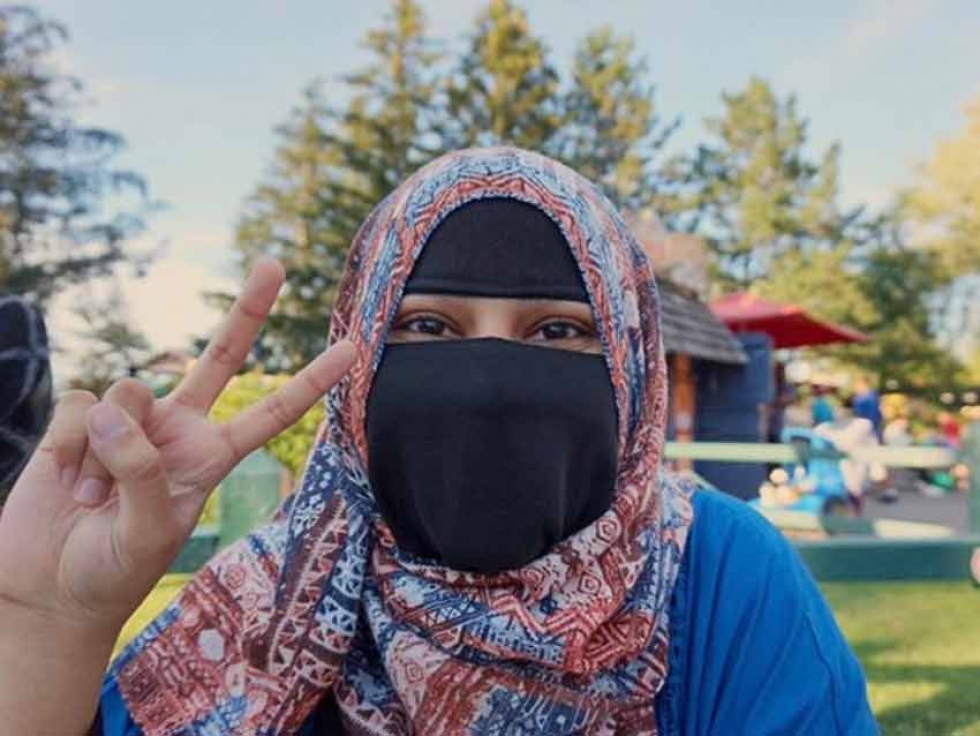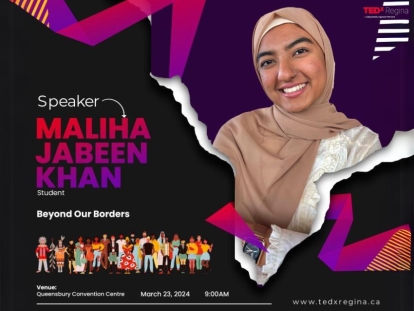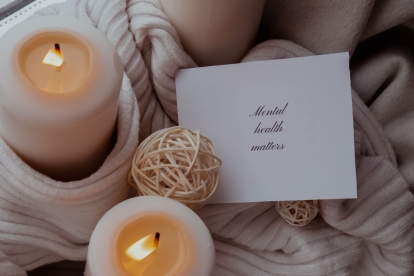 Muslim Link interviews Pakistani Canadian social media influencer Aima Warriach who wears niqab.
Muslim Link interviews Pakistani Canadian social media influencer Aima Warriach who wears niqab.
Nov
Of Islamophobes and Wallah Bros: What This Canadian Feminist Wants You To Talk About Instead of Her Niqab
Written by Chelby DaigleMuslim Link had the opportunity to interview Pakistani Canadian social media influencer Aima Warriach who wears niqab. Her profile as part of The Sisters Project by artist Alia Youssef recently appeared in The Globe and Mail. Aima is the winner of the Create Dialogue Challenge via Adobe 1324 and TEDxTeen. She is also a 2017 MAX Gala finalized in their Film for Change video competition. She is currently studying politics and governance at Ryerson University in Toronto.
1. As a woman who wears niqab, you speak about being a primary target for violent Islamophobia. This is a reality that even many Muslims don't fully understand and often in discussions around the right to wear niqab, niqabis aren't even invited to the table by other Muslims to speak. What are your thoughts on this and how can Muslims in Canada be better allies to women who wear niqab?
It comes down to the perceptions and biases that people hold against niqabis. Our community undermines our skills and talents and implements the barriers created by colonizers and cultural norms. When I chose to observe niqab, many presumed it would shut me up and limit my career options which in turn would make me a stereotypical niqabi you see portrayed in fetishized movies who has lost the ability to live for herself and only focuses on the gender norms she needs to subscribe to in order to please the patriarchs.
Now that isn't the case. Niqabis a pretty lit group of chicks who are resilient in fighting for our rights which in turn will be the rights of other community members. Governments targeting the niqab will eventually target other religious clothing like the hijab or the yarmulke or the turban. It's an endless chain reaction to make us feel less Canadian than we already do. Community members need to “Pass the Mic” (provide space for other people to speak out). We aren't docile and fragile to critique. We are here to learn and want to be integral to the Muslim fabric here in Canada. Personally, I use my social media platforms to reach out to other sisters and build a support network which allows for us to collectively call out discrimination where we see it.
2. What has been the impact of Islamophobia on your mental health? What do mental health service providers need to know in order to better serve women who wear niqab?
For me personally, I do have anxiety and sometimes don't want to leave the house because of the news that say as I'm writing this I probably won't leave my house today because of what happened in NYC just to play it safe but then I also don't want to miss class (Editor’s Note: Our interview took place the same day as the NYC Terrorist attack). I would like to see more representation. Muslim Students Associations (MSA)'s and other Muslim Youth groups should incorporate niqabis in their branding.
To be honest it is hard to see that your community cares more about a scholar’s honour (Referring to the reaction of many Muslims in response to the Nouman Ali Khan scandal) than providing resources to survivors (many Muslims’ reactions to the Nouman Al Khan scandal were triggering for Muslim survivors of sexual violence and harassment) or providing platforms to haters (Referring to University of Toronto Professor Jordan Peterson being invited to speak at the Reviving the Islamic Spirit Conference. After many members of Toronto’s Muslim community protested and threatened to boycott the conference, he was removed from the conference’s lineup).
Niqabis already have the emotional labour of explaining and showing via our actions why we aren't oppressed but then some Muslims gotta act like trash which lets others use it as evidence to why we are oppressed.
3. You identify yourself as a feminist. What does that mean to you?
I am an intersectional Feminist. Me choosing to wear the niqab will never be about imposing my choice on others and defining their lives by dictating how one should dress. You aren't less of a woman for dressing modestly or less of a woman for not conforming to Eurocentric beauty standards nor are you less of a woman for wearing clothes that make you feel more confident in your body and self.
I am in no way whatsoever going to slut shame (blaming women for sexual violence/harassment because of their appearance) or victim blame and tell women to dress and behave differently so that their male counterparts can learn to behave.
I completely stand by the right of women who were forced to wear the niqab or burqa and stripped of their free will to take off and burn the burqa or niqab.
I do not speak for all Muslim women and can only speak to my experience.
4. How do you reconcile wearing niqab and being outspoken against rape culture in Western and Muslim societies?
I was sexually molested on the train here when it was jam packed while observing my niqab, A solution to rape is not that women cover up. Creeps and pervs will act on their disgusting inclinations and won't bat an eye about what a woman is wearing. Saying that it is because of what a woman is wearing that she got raped is just an excuse so that men don't take responsibility for their actions.
What about men's hijab? Rape culture affects men too just take for example Prophet Yusuf A.S and the assault he faced from Zuleikha and then he falsely imprisoned. Rape culture is about power not what you are wearing.
Often times the solutions are in the Quran and Seerah (life stories) of the Prophets yet some Muslims pin the root of the problem on feminism when all feminism does is remind Muslim women of their rights that are due to them spiritually and dunya-wise (in this world). RAPE IS HARAAM (forbidden). You can’t rape a woman even if she's married to you! It's called marital rape. Honor killing is Haraam (forbidden). No woman should beg for the mercy of a man when he too is made out of clay. Allah swt himself decreed that only by piety and our good deeds do we differ yet in any other aspect we are equal before his eyes.
Islamophobes use rape and oppression of women by Muslims to deflect from the issues that haunt their own societies. What effects all women has been narrowed down to what affects liberal white women or in other terms what affects Becky (a white woman who uses her privilege as a weapon, a ladder or an excuse) who only fights until she receives justice for herself and by her Western standards all others who do not embraced her version of what makes her feel empowered are by default oppressed.
But then you have the Wallah Bros! They do the same thing but they use problems in Western society to deflect from issues in the Muslim community. Wallah Bros are men who slide into your dms (direct messages on social media) to give you so-called naseeha (advice) but fail to replicate that same naseeha to their bro who's harassing sisters’ online!
A Wallah Bro will say that Muslim women are not oppressed and don't need feminism but he still waits on female relatives to bring him a glass of water!
Some Muslim men get offended when they hear that some men are trash, but if you aren’t trash why would you get offended?
5. You are one of a number of young Muslim Canadian activists who stand up against Islamophobia and for Muslims but who often don't wish to conform to Muslim standards of etiquette in terms of speech (ie you sometimes swear in videos online posts etc). Why is it important for you to speak online the way you may speak with friends etc.?
To be honest I am often just quoting what was said to me online by haters, they don't censor their comments when they attack me so why should I water down my experience so people can feel more comfortable about it? If people are so preoccupied by me swearing then their priorities need to be checked. (Video below contains swearing. Viewer Discretion is Advised).
6. As a target of Islamophobia you are often held accountable for the human rights abuses of Muslims in other countries. In your latest video you speak directly about this issue in a very logical manner, not dismissing or downplaying some of the serious issues of human rights abuses in Muslim majority countries but stating the obvious that you as a Canadian University student can't do much to change the government in these countries. Do you feel that as someone who identifies as an activist for social justice it is important to know about and stand up against human rights abuses in Muslim majority countries as well as those in Canada.
There is a clear line between holding governments accountable and finger pointing to scapegoat someone and deflect from your own faults and failures. I can certainly participate in actively trying to dismantle the systems that oppress women but the way people implement sharia law in Muslim majority countries is their own interpretation. In Islam there is no compulsion in religion and it is a personal dynamic between you and your Lord. The Catholic Church used the Bible to justify their racism and abuse, but are all Catholics responsible for this? Nope. Ethnic cleansing and oppression of minorities isn't a Muslim or Islamic problem. Humans are the problem. Most religions preach peace and respect of your neighbors even if they differ from you. Yet we are living in a capitalistic society engrossed in our self-interests that religion and the like is being used to justify land theft, war, genocide, racism, ethnic cleansing, poverty etc.
7. We’ve been talking a lot about negatives but in reality you have had a lot of opportunities because of your work. Tell us about that.
I have had opportunities like going to New York for the TEDxTeen conference where the theme this year was create dialogue. I felt it was necessary for me to use my experience as a niqabi to direct the narrative around our autonomy. When we speak we need to demand that people listen. After I got off the podium other attendees came to me saying what I said was profound even though many advocate for women’s autonomy but having my message juxtaposed with the way I dress seems to have had a deeper impact on them.
I’m not only here to fight for my rights, that would be selfish, I’m here trying to prevent others’ rights from being infringed on. We have the right to dress and believe in what we want because that is freedom.
8. What’s next for you?
Inshallah, I want to work for an NGO and become a paid writer at MuslimGirl. I would also love to travel to Spain and Turkey!
Aima Warriach will be speaking on a panel about niqab on November 27th in Toronto. Click for details here.
This article was produced exclusively for Muslim Link and should not be copied without prior permission from the site. For permission, please write to info@muslimlink.ca.






